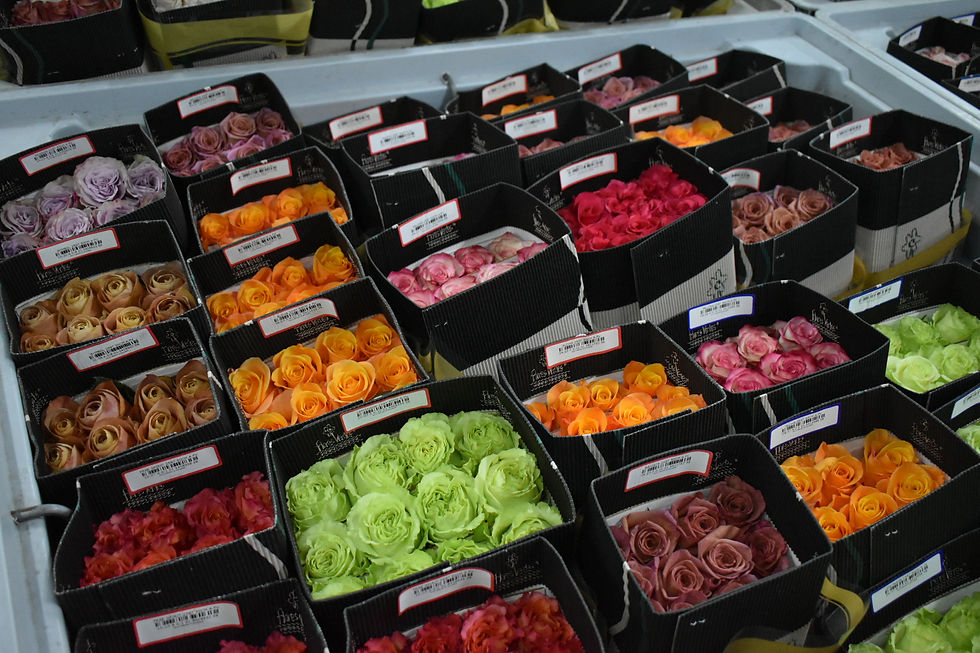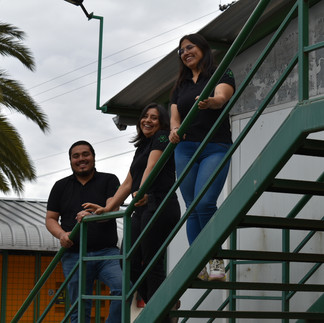Sustainability in practice: Flores Verdes
- Ecuador y sus Flores

- Oct 15, 2025
- 3 min read
Ecuador is the world's third-largest flower exporter, with more than 5,000 hectares dedicated to cultivation and nearly 50,000 direct jobs. In an increasingly demanding market regarding environmental and social matters, Ecuadorian flower farms face the challenge of demonstrating that their operations go beyond discourse. Flores Verdes, a farm located in Ecuador's highlands, has committed to concrete sustainability projects addressing three fronts: reforestation, clean energy, and comprehensive water and waste management.
Reforestation: beyond planting trees
The farm maintains a riparian zone along the river where it has established linden tree species with a clear purpose: preventing erosion and protecting the watercourse. But the project goes further. Flores Verdes is progressively replacing traditional bamboo boundaries with living fences. The farm has already planted approximately 2,500 Eugenia plants, which function as biological corridors and windbreaks.
These areas are maintained using low-reach sprinkler irrigation and manual weed control.

"We constantly apply organic fertilizer from our institutional composting facility," the company explains.
The system enriches the soil without relying on external inputs, closing the nutrient cycle within the operation itself.
Solar energy in numbers
Flores Verdes is about to implement a photovoltaic system that will cover 84% of its annual energy demand. The project includes 194 solar panels with a capacity of 125.7 kWp, which will generate an average of 166,836 kWh per year. The installation will occupy 608 m² and will operate under the "on-grid" modality, connected to the public network.
The environmental figures are clear: a reduction of 61 tons of CO₂ per year is expected equivalent to planting more than 9,000 trees.
The system operates under the net metering scheme regulated by ARCONEL 005-2024, which allows excess energy to offset future consumption. The implementation includes engineering, legalization, equipment, installation, and comprehensive maintenance during the first year.
Water and waste: control at every stage
For agricultural use, Flores Verdes implements drip irrigation technology that directs water directly to the root zone. The system is fed from a reservoir connected to an irrigation board and a deep well. "We monitor consumption using nanometers and internal records," they note. Every drop counts and is recorded.
For human consumption, groundwater from the well undergoes complete treatment: flocculation, coagulation, disinfection, and filtration. The process ensures compliance with national safe consumption parameters.

Wastewater is conducted to a treatment plant with a sediment retention system and filters made of gravel, stone, sand, and activated carbon. Throughout the farm, there are ecological collection points for plastics and common waste. Cardboard and plastics from post-harvest are accumulated in a specific area to be delivered to authorized recycling managers.
Hazardous waste—agrochemical containers, fumigation hoses, contaminated protective equipment—is stored in a signposted and equipped area. From there, final disposal is carried out with authorized environmental managers, ensuring traceability and legal compliance.
Due to its responsible water resource management, Flores Verdes has obtained the honorary recognition "Punto Azul" (Blue Point) awarded by Ecuador's Ministry of Environment, Water and Ecological Transition.
Measurable sustainability

Sustainability today is a topic about which much can be said. The reality is that impact is measured in concrete actions and figures. 2,500 Eugenia plants planted, 84% energy coverage with renewables, 61 fewer tons of CO₂ per year, water treatment systems with defined stages. These numbers are Flores Verdes' concrete actions.

In a sector where sustainability has become a requirement for entering international markets, Flores Verdes is building an operational model that responds with real data. Ecuador's floriculture industry doesn't just export flowers. It also exports the way those flowers are produced.










Comments